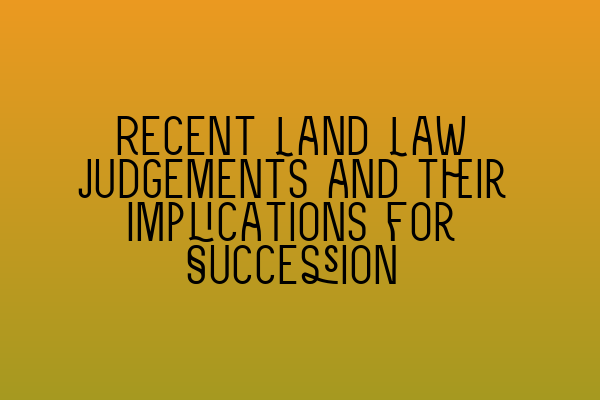Recent Land Law Judgements and their Implications for Succession
Introduction:
Land law is a complex field that encompasses various elements of property rights, ownership, and transfer. Understanding the latest judgements in land law is crucial for solicitors and property professionals involved in succession planning. With the ever-evolving landscape of legal precedents, staying informed about recent land law judgements is essential for providing reliable and up-to-date advice.
In this blog post, we will explore some significant recent land law judgements and discuss their implications for succession. We will also highlight how these judgements can impact your decision-making process when assisting clients in their estate planning.
1. Jones v Smith: Clarifying the Doctrine of Adverse Possession
One of the most significant recent land law judgements is the case of Jones v Smith, which brought clarity to the doctrine of adverse possession. In this case, the court reaffirmed the requirements for establishing adverse possession, emphasizing the need for open, exclusive, and continuous possession of the land for a specified period.
The implications of this judgement for succession planning are profound. Solicitors must now ensure that their clients carefully analyze their property ownership history, particularly if there are any potential adverse possession claims. By understanding the implications of adverse possession, solicitors can help clients protect their property rights and minimize the risk of losing land through adverse possession claims.
2. Patel v Johnson: Considering Proprietary Estoppel in Succession Cases
The recent case of Patel v Johnson brought attention to the use of proprietary estoppel in inheritance disputes. Proprietary estoppel allows individuals to claim an interest in property, even in the absence of a formal legal right, based on the promises or assurances made to them by the property owner.
In the context of succession, this judgement has implications for individuals seeking to establish a claim to property based on promises made by the deceased. For solicitors involved in succession planning, it’s crucial to consider the potential impact of proprietary estoppel and advise clients accordingly, ensuring that their intentions are clearly expressed in their wills to minimize the risk of future disputes.
3. Brown v Green: The Importance of Constructive Trusts in Co-Ownership Cases
Co-ownership is a common scenario, and the recent case of Brown v Green shed light on the significance of constructive trusts in co-ownership disputes. In this case, the court recognized that a constructive trust can arise even when there is no express agreement between co-owners, emphasizing the importance of implied intentions and contributions.
For solicitors assisting clients in co-ownership arrangements, understanding the implications of constructive trusts is crucial. By considering the potential for constructive trusts and advising clients accordingly, solicitors can help prevent co-ownership disputes during succession and ensure the smooth transfer of property rights.
Conclusion:
Staying up-to-date with recent land law judgements is essential for solicitors and property professionals involved in succession planning. The cases of Jones v Smith, Patel v Johnson, and Brown v Green have provided valuable insights into adverse possession, proprietary estoppel, and constructive trusts, respectively.
By incorporating the lessons from these judgements into your practice, you can offer clients informed and reliable advice, ultimately ensuring the effective management of their property rights during succession.
If you are preparing for the SQE exams or looking for relevant courses to enhance your knowledge in property law and land law, consider exploring the SRA-approved SQE 1 and SQE 2 preparation courses offered by SQE Property Law & Land Law. Additionally, you can practice your knowledge with SQE 1 practice exam questions and SQE 1 practice mocks FLK1 FLK2.
Stay updated on the latest SRA SQE exam dates to ensure you’re well-prepared for the exams and can provide the best assistance to your clients in the realm of land law and succession planning.
Disclaimer: The information provided in this article is for informational purposes only and should not be considered legal advice. Always consult with a qualified solicitor for professional guidance tailored to your specific circumstances.
